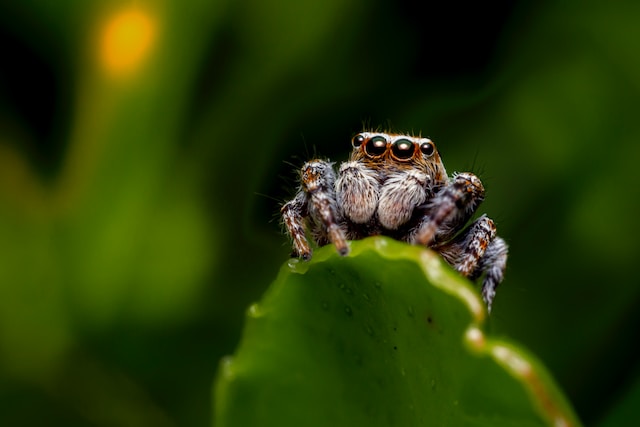Are you tired of sharing your home with unwanted pests in North Carolina and have questions about what makes your Raleigh property a spider hotspot?
Well, you’re in luck! In this blog post, we’re going to explore the diets of spiders and their eating habits. Do spiders eat roaches, flies, ants, and other household pests that overtake your home?
We know that pests can be a nuisance and often leave homeowners feeling frustrated and overwhelmed. Understanding the diets and behaviors of spiders is just one piece of the puzzle regarding effective pest control. Keep reading to learn more!
How Do Spiders Catch Food?
Let’s talk about how spiders are fierce predators that use their unique senses and physical abilities to catch their prey.
Picture this: you’re a tiny insect minding your own business when suddenly, you feel a sharp bite, and everything goes dark. You’ve just become a spider’s next meal!
Spiders are excellent hunters that have evolved over millions of years to become some of the most skilled predators on the planet. With over 48,000 known species, they come in all shapes and sizes and use a variety of tactics to catch their prey.
Some spiders, like the orb-weaving spider, use their web-spinning abilities to create intricate traps designed to catch unsuspecting insects. Once an insect gets caught in the web, the spider moves in quickly and immobilizes it with a venomous bite. These spiders are like the architects of the insect world, building beautiful and deadly structures that can span several feet in diameter.
Other spiders, like the jumping spider, are active hunters that will use their incredible senses and physical abilities to pursue their prey. They are so agile that they can even jump several times their body length to catch their prey. These spiders are like the ninjas of the spider world, using their agility and keen eyesight to stalk their prey and then pouncing with lightning speed.

But no matter their tactic, all spiders have one thing in common – they are carnivores that feed on other animals. And while some species of spiders can be dangerous to humans, most spiders have venom that is only potent enough to immobilize their prey.
Once the prey is immobilized, the spider uses its fangs to inject digestive enzymes into its body. These enzymes will break down the prey’s internal organs and turn them into a liquid the spider can consume. It may sound gruesome, but this process is essential for spiders to survive and thrive.
A Spider’s Diet: Do Spiders Eat Roaches?
Let’s take a closer look at these eight-legged hunters! Spiders are more than just creepy-crawly creatures; they are skilled predators with impressive abilities. Their incredible senses and physical prowess allow them to catch prey in some of the most creative and cunning ways imaginable.
These outdoor hunters have an incredibly diverse diet, feasting on everything from buzzing flies and moths to crawling beetles and crickets. They even devour other arachnids like mites, ticks, and unsuspecting snails and slugs.
But for some of the largest spiders in the world, like the infamous Goliath birdeater spider found in South America, these creatures are no match. With a body weight of up to 6 ounces and inch-long fangs, they can take down small birds and snakes!
But let’s talk about spiders living the indoor life! While they may not be the most popular roommates, these eight-legged creatures have adapted to life inside our homes and can find a steady food supply.
So, what’s on the menu for these indoor spiders? Well, they have a varied diet that includes common household insects such as houseflies, fruit flies, and ants.
Interestingly, spiders can also feed on other spiders, including members of their own species. So, if you spot multiple spiders in your home, they might not necessarily be fighting over territory – they could be sharing a meal!
But do spiders eat roaches?
While we may not be the biggest fans of roaches, spiders sure are! These little arachnids are skilled predators and are more than capable of catching and devouring these pesky insects.
Roaches are a favorite food item for many spider species, and it’s not hard to see why. Roaches contain essential nutrients spiders need to survive, such as protein and other vitamins. Plus, compared to other fast-moving insects, roaches are relatively slow, making them an easier target for spiders to catch.
But why do spiders bother to eat roaches in the first place? Well, in addition to being a delicious meal, roaches can also be a competitor for resources like food and shelter. By reducing the number of roaches in their environment, spiders can increase their chances of survival and improve their access to resources.
While spiders may help control roach populations, it’s important to note that they are not a substitute for proper pest control measures. If you have a roach infestation in your home, it’s essential to eliminate their food and water sources, seal up cracks and crevices where they can enter, and use appropriate pest control methods.
If you’re tired of sharing your Raleigh home with spiders and roaches, it’s time to take action! Contact us today to eliminate these unwanted guests from your home.






